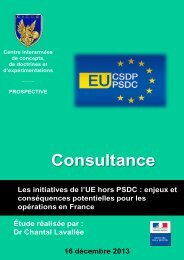Conference
science-research-bulletin-2013-conference
science-research-bulletin-2013-conference
Create successful ePaper yourself
Turn your PDF publications into a flip-book with our unique Google optimized e-Paper software.
EUROPEAN POLICE SCIENCE AND RESEARCH BULLETIN<br />
SPECIAL CONFERENCE EDITION<br />
of a membership in the European Union<br />
(e.g. unification and harmonisation of police<br />
legislation and practices), especially in Slovenia<br />
and Poland with the highest means regarding<br />
trust in police and legitimacy.<br />
In addition, trust is highest in Slovenia despite<br />
the fact that the data were collected in times of<br />
socioeconomic crisis and public protests against<br />
the government and corrupt politicians, and<br />
the lowest in Russia. The results for legitimacy<br />
also imply the highest perceived legitimacy in<br />
Slovenian and the lowest in Serbia and Bosnia<br />
and Herzegovina.<br />
Regression analysis shows that police authority<br />
and procedural justice are related to trust in the<br />
police in all countries and police effectiveness in<br />
Slovenia, Russia, Romania, Poland, Bosnia and<br />
Herzegovina, and Croatia. To draw a tentative<br />
conclusion, the police should strive to improve<br />
their authority and increase procedural justice,<br />
especially their interactions with the public<br />
generally and with vulnerable social groups.<br />
In addition, police authority should also be<br />
improved, but not only by presentation of police<br />
statistical data but with successful convictions<br />
of criminals on the one hand and prevention of<br />
illegal acts on the other. Community policing,<br />
especially policing by consent, could improve<br />
legitimacy, as shared values are a prerequisite for<br />
successful work with communities which do not<br />
share (or share a small amount of) values with the<br />
majority of population. We know that all these<br />
factors have also some political connotation<br />
because the police are an extended arm of the<br />
state.<br />
Unlike in the other studied countries, due to the<br />
economic crisis, the end of 2012 was characterised<br />
by the public protests against corrupt politics and<br />
politicians in the capital city Ljubljana and several<br />
other larger towns across Slovenia. This fact has<br />
to be taken into consideration in understanding<br />
the results of our survey, especially in regard to<br />
Slovenia. Another survey on trust in the police<br />
before and after the demonstrations shows that<br />
people who participated in the protests believed<br />
that the police exceeded their powers and<br />
report the decrease in trust in the police while<br />
others trusted the police even more than before<br />
(Simončič, 2013). Nevertheless, the results of our<br />
survey show that trust and legitimacy are the<br />
highest in Slovenia in all of the studied countries<br />
(see Table 2) presumably due to the fact that<br />
community policing has been quite developed<br />
over the years (Meško, Fields, Lobnikar, and<br />
Sotlar, 2013) and the police were also affected<br />
by the austerity measures (a significant reduction<br />
of a public budget for the police, reduction in<br />
staffing, early retirements due to the austerity<br />
legislation) and increased activities of the<br />
police union in fighting for the labour rights of<br />
the police. The Slovenian public opinion poll<br />
conducted in 2010 reveals citizen satisfaction<br />
with police work and attitudes in general. Twothirds<br />
of respondents expressed their satisfaction<br />
with police attitudes towards residents and<br />
reported respectful behaviour of police officers<br />
in police procedures. Moreover, two-thirds of<br />
respondents believe that police officers are<br />
honest and unbiased (Kurdija, Malnar, Uhan,<br />
Hafner Fink, and Štebe, 2012).<br />
Tyler and Fagan (2008) proved that legitimacy<br />
influences citizens’ cooperation with the police.<br />
Results showed that legitimacy is linked to<br />
police authority and procedural justice; whereby<br />
positive personal experience in police procedure<br />
increases the legitimacy. Bearing this in mind,<br />
the police can influence their legitimacy by<br />
paying attention to their behaviour towards the<br />
people. Bradford, Jackson and Hough (2013:<br />
563) found out about the same with placing<br />
measures of trust and legitimacy at the centre<br />
of policy assessments of police actions and<br />
behaviours. In Slovenia, Jere (2013: 159) studied<br />
citizens’ attitudes toward the police provision<br />
of safety/security and found that citizens will<br />
only cooperate with the police when they are<br />
able to justify and legitimise the common goal<br />
in the context of their own values, norms and<br />
goals. To conclude, to increase trust in the police,<br />
perception of police legitimacy, politicians should<br />
also take a moment to reconsider their role in a<br />
democratic society. We believe that there can<br />
never be too much integrity, honesty, fairness in<br />
dealing with clientele of criminal justice system,<br />
be it in police proceedings or in any other formal<br />
social control activity.<br />
80





